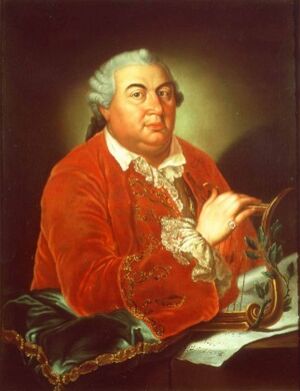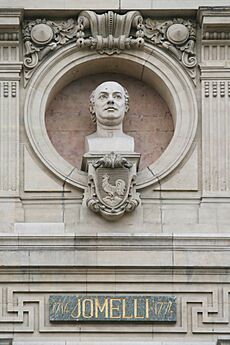Niccolò Jommelli facts for kids
Quick facts for kids
Niccolò Jommelli
|
|
|---|---|
 |
|
| Born | 10 September 1714 Aversa
|
| Died | 25 August 1774 (aged 59) |
| Occupation | Composer |
Niccolò Jommelli (born September 10, 1714 – died August 25, 1774) was a famous Italian composer. He was part of the Neapolitan School, a group of composers from Naples. Jommelli helped change opera by making it less fancy and focusing more on the story and drama.
Contents
Jommelli's Early Life and Music Journey
Growing Up and Learning Music
Niccolò Jommelli was born in Aversa, a town near Naples, Italy. His parents were Francesco Antonio Jommelli and Margarita Cristiano. His father was a successful linen merchant.
Niccolò showed musical talent early on. In 1725, when he was 11, he started studying music at the Conservatorio di Santo Onofrio a Capuana in Naples. He later moved to another school, the Conservatorio della Pietà dei Turchini. There, he learned from important teachers like Niccolò Fago.
A big influence on Jommelli was Johann Adolf Hasse, another composer who was in Naples at the time. Jommelli learned a lot from Hasse, especially how to use music to make dramatic moments in operas more exciting.
His First Operas
After finishing his studies, Jommelli started writing his own music. His very first opera was a comedy called L'errore amoroso (meaning The Loving Mistake). It was performed in Naples in 1737 and was a big success!
He then wrote another comedy, Odoardo, in 1738. His first serious opera, Ricimero re di Goti, was performed in Rome in 1740. It was so popular that he quickly got asked to write more music for important people, including Henry Benedict Stuart, a powerful cardinal.
Jommelli was known for using a special kind of musical speech called obbligato recitative. This made the story parts of his operas much more dramatic and exciting.
Learning from Padre Martini
In 1741, Jommelli went to Bologna for one of his operas. There, he met Padre Martini, a very respected music teacher. Some say Jommelli studied with Martini, which helped him improve his composing skills.
During this time, Jommelli also started writing more religious music, like oratorios. An oratorio is like an opera but without costumes or acting, usually based on a religious story.
Working in Venice
Around 1745, Jommelli got an important job in Venice. He became the Director of Music at the Ospedale degli Incurabili. This was a special school for female musicians. His job was to compose sacred music for the church choir and teach advanced students.
This job gave him a steady income, which allowed him to write many other musical works. He composed several oratorios during his time in Venice, including "Isacco figura del Redentore" and "La Betulia liberata."
Jommelli left Venice around 1746 or 1747. He then went to Rome and Naples to stage more of his operas.
Time in Rome
In 1749, Jommelli moved to Rome. He was invited by Cardinal Henry Benedict to compose an oratorio called La passione di Gesù Cristo. This was for the Jubilee festival, a very important event for the Roman Catholic Church that happened every 50 years. This was a great chance for Jommelli to show his talent to important people.
Life in Stuttgart and Later Years
After Rome, Jommelli visited Vienna. In 1753, he took a job as Kapellmeister (music director) for Duke Karl Eugen in Stuttgart, Germany. This was a very successful time for Jommelli. He wrote some of his best works during these years. Many of his operas were performed in the Duke's private theaters.
In 1763, a young Mozart and his father, Leopold, met Jommelli in Ludwigsburg. Imagine two great composers meeting!
Jommelli returned to Naples in 1768. By this time, a different style of opera, called opera buffa (comic opera), was more popular than his serious operas (opera seria). Because of this, his last works were not as well-received. In 1771, he had a stroke that partly paralyzed him. However, he kept composing until he passed away three years later in Naples.
Jommelli's Musical Creations
Jommelli wrote many different types of music. He composed cantatas (pieces for singers and instruments), oratorios (religious stories set to music), and other sacred works. But his most important works were his operas. He wrote about 60 serious operas, many with stories by the famous writer Metastasio.
Jommelli's operas were special because they focused more on the story and drama, rather than just showing off the singers' voices. He included more group songs (ensembles) and choruses. He was also influenced by French opera composers, so he added ballets into his works.
He used the orchestra in a much bigger way. Instead of just supporting the singers, the orchestra helped tell the story with its own music. He also used orchestrally accompanied recitatives, where the orchestra plays along with the singing, making it more dramatic than just a voice with a harpsichord. Many people think his changes to opera were as important as those made by Christoph Willibald Gluck.
Types of Music Jommelli Wrote
- Chamber Music: Smaller pieces for a few instruments, like his Sonata in C for Organ 4-Hands.
- Instrumental Music: Pieces just for instruments, such as his Ciaccona for Organ.
- Masses: Religious music for church services, including his famous Missa pro defunctis (Requiem) in Eb.
- Psalms: Settings of biblical psalms, like his various Miserere pieces.
- Oratorios: Dramatic religious stories set to music, such as Isacco, figura del Redentore and La Passione di Gesù Cristo.
- Operas: His most important works, including:
- L'errore amoroso (1737) – his first comedy
- Ricimero re de' Goti (1740) – his first serious opera
- Didone abbandonata (1747)
- Fetonte (1753)
- Catone in Utica (1754)
- Il Vologeso (1766)
- Armida abbandonata (1770)
- Ifigenia in Tauride (1771)
Recordings of Jommelli's Music
You can listen to Jommelli's music today! Many of his works have been recorded. Some popular recordings include:
- Concertos in collections like Neapolitan Flute Concertos.
- His Requiem mass.
- Several of his operas, such as Armida abbandonata, Didone abbandonata, and Il Vologeso.
- His comic opera L'uccelatrice e il Don Narciso.
See also
 In Spanish: Niccolò Jommelli para niños
In Spanish: Niccolò Jommelli para niños
 | Delilah Pierce |
 | Gordon Parks |
 | Augusta Savage |
 | Charles Ethan Porter |


